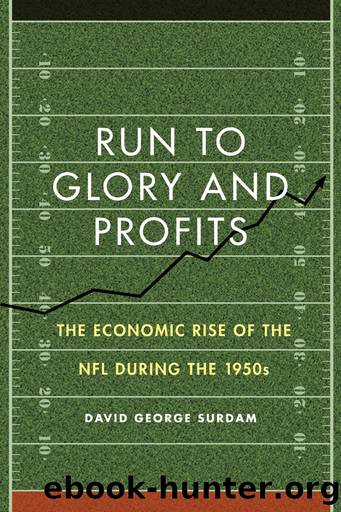Run to Glory and Profits by David George Surdam

Author:David George Surdam [Surdam, David George]
Language: eng
Format: epub
ISBN: 978-1-4962-0970-2
Publisher: University of Nebraska Press
Published: 2013-08-15T00:00:00+00:00
Parker was incorrect.
Athletes were not the only glamorous people being economically exploited. Until Olivia de Havilland and Bette Davis took on the motion picture studios, actors and actresses faced their own version of a reserve clause. Davis lost her lawsuit in 1937, but de Havilland won hers in 1944.13 In both baseball and motion pictures, owners claimed that they invested significant amounts of money into developing their workersâ talents, and that they would not invest without some form of property rights to these workers, much to the detriment of the quality of play or of acting.
On occasion, someone associated with the NFL would strip away the façade. Disgruntled coach Norman âRedâ Strader, fired from the New York Yanks, sued team owner Ted Collins. In his affidavit, Strader âdescribed the method of drafting college stars as âillegalâ and contended that the club owners have arbitrarily set up a âfootball czarâ to enforce the system.â Strader won his case against Collins, but nothing came of his remarks against the draft.14
The New York Giantsâ Arnie Weinmeister decided to play for the Vancouver Lions after the Giants told him in a letter that he would be replaced in the coming season. Weinmeister told Wellington T. Mara that he would not be back for the 1954 season and signed with Vancouver for $15,000. The Giants promptly sued. Part of their claim was that Weinmeister was an âindispensable partâ of the team. Weinmeisterâs attorneys, ironically, tried to demonstrate that fans came see to the backfield men perform, not lowly tackles such as Weinmeister. An interesting aspect of Weinmeisterâs case, in addition to Maraâs letter, was Wellington Maraâs confession that he had paid Weinmeister $1,000 more than his contract stipulated: âWeinmeister contends the contract figure of $11,000 approved by the NFL commissioner, was exceeded, voiding the contract.â This novel legal argument â âYour honor, he paid me too much, so the contract is voidedâ â did not prevent Weinmeister from prevailing, as Maraâs letter proved to be pivotal.15
Players retained Creighton Miller, a former Notre Dame halfback turned attorney, to represent them in negotiations with the commissioner and with club owners.16 The playersâ main demand was for a player pension similar to that provided to baseball players. The players also hoped to get nominal payment for exhibition games, a minimum salary, and some other concessions. Aside from the pension, their demands were shockingly modest, which was also true of demands made by baseball and basketball players. Owners might have forestalled greater militancy later on by accepting these modest demands and recognizing the Players Association. Instead, some owners, such as George Preston Marshall, were outraged: âThe proposals sound ridiculous and, from a practical standpoint, they donât deserve any recognition from me. Itâs a matter for Commissioner Bell.â Edwin W. Pauley, co-owner of the Los Angeles Rams, heard the news with placidity: âI believe it will help pro football. Itâs the same as in any business. There is nothing to fear.â17
The NFL Constitution allowed players to bring labor-related matters to the commissioner.
Download
This site does not store any files on its server. We only index and link to content provided by other sites. Please contact the content providers to delete copyright contents if any and email us, we'll remove relevant links or contents immediately.
Periodization Training for Sports by Tudor Bompa(8274)
Bodyweight Strength Training by Jay Cardiello(7918)
Therapeutic Modalities for Musculoskeletal Injuries, 4E by Craig R. Denegar & Ethan Saliba & Susan Saliba(7722)
Born to Run: by Christopher McDougall(7128)
Imperfect by Sanjay Manjrekar(5878)
Wiseguy by Nicholas Pileggi(5787)
Shoe Dog by Phil Knight(5270)
Paper Towns by Green John(5191)
The Body: A Guide for Occupants by Bill Bryson(5098)
The Rules Do Not Apply by Ariel Levy(4970)
Endurance: Shackleton's Incredible Voyage by Alfred Lansing(4784)
Tuesdays with Morrie by Mitch Albom(4784)
Bodyweight Strength Training Anatomy by Bret Contreras(4684)
The Sports Rules Book by Human Kinetics(4388)
Yoga Anatomy by Kaminoff Leslie(4364)
Machine Learning at Scale with H2O by Gregory Keys | David Whiting(4313)
Dynamic Alignment Through Imagery by Eric Franklin(4217)
Science and Development of Muscle Hypertrophy by Brad Schoenfeld(4136)
Exercise Technique Manual for Resistance Training by National Strength & Conditioning Association(4073)
